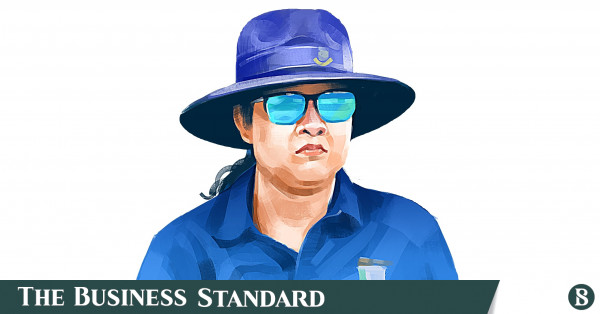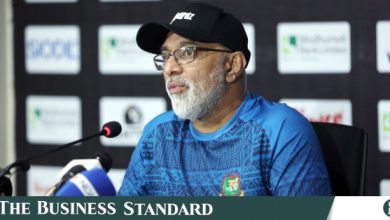‘World Cup being taken away from Bangladesh has set women’s cricket back by two years’

Being a female cricketer in Bangladesh has its plethora of challenges from all ends.
But despite these, Sathira Jakir Jesy has managed to overcome it all and play for the national team.
Not only that but following her international cricket career, she has done cricket commentary and is now the first female Bangladeshi umpire to officiate in an international match.
This trailblazer spoke with The Business Standard about women’s cricket in Bangladesh and the impact of the T20 World Cup being shifted to the UAE along with her personal goals in an exclusive interview.
The Women’s World Cup would have provided tremendous exposure to women’s cricket in Bangladesh. However, with it being moved to the UAE, what are your thoughts on this decision?
Had it been held in Bangladesh, it would have been a fantastic opportunity for all of us – from the cricketers to the media, and for the cricket industry as a whole. It could have paved the way for us to host more international tournaments in the future. Playing in front of a home crowd would have been a significant confidence boost for our players. Also, with the event moving to the UAE, the media coverage in Bangladesh is bound to suffer. Aside from India, cricket is covered the most in Bangladesh, and this change robs us of that exposure. Overall, I believe it has set the progress of women’s cricket back by at least two years.
After speaking with the head of the women’s wing at the Bangladesh Cricket Board (BCB), Habibul Bashar Sumon, he mentioned that this change of venue has had a heavy mental impact on the players. As you were set to umpire in these matches had they been in Bangladesh, how has this affected you personally?
It has undoubtedly affected me. I had spent months mentally preparing myself for the opportunity to umpire these matches in my own country, and I was quite certain I would be selected. Now, with the venue changed, that chance has been taken away. Bangladesh would have required at least 12 umpires due to the distance between Dhaka and Sylhet, but in the UAE, they’ll likely only need around 10, most of whom have previous World Cup experience. Naturally, I was left out. This would have been a great platform for me to showcase my skills, which could have led to future opportunities to umpire in ICC tournaments.
What are your future plans and mindset regarding your umpiring career?
With several international tournaments on the horizon, like the Women’s U-19 Asia Cup and the U-19 World Cup, my focus is now on securing a place in those competitions, should the BCB select me. For instance, one of the umpires from Zimbabwe earned a promotion after performing well in the U-19 World Cup, despite not umpiring in the previous senior World Cup. Similarly, having umpired in the Senior Women’s Asia Cup, I’m confident I stand a good chance of being selected for upcoming tournaments. If I perform well, it could open doors for me to umpire in the ODI World Cup.
What do you think were the shortcomings of the previous administration when it comes to women’s cricket?
Honestly, no past board has paid enough attention to women’s cricket. Even those appointed as heads of operations didn’t show much commitment to their duties, whether they were selectors or administrators. However, I believe things are starting to change. The recent appointment of two new selectors, and Habibul Bashar bhai’s involvement, have given hope for development. I’ve also heard that Najmul Abedin Fahim sir will be taking on some responsibilities in women’s cricket, which is promising. Another issue is that women cricketers aren’t given enough media exposure compared to their male counterparts. The board must ensure that women’s cricketers are given the same opportunities and treated fairly if we are to see consistent results and improvements from the women’s team. If these aspects are addressed, I’m optimistic that better days lie ahead for women’s cricket in Bangladesh.
What initiatives should the board undertake to improve the domestic structure of women’s cricket?
Sumon bhai has mentioned plans to organise more domestic tournaments for women, which is encouraging. The recently concluded NCL (National Cricket League) was a significant initiative, given the current challenges in the country. The previous board had been discussing this tournament for over a year and a half but never took action, so the new administration is already making positive strides. In addition, first-class tournaments are essential, as per ICC rules, to prepare our women’s team for Test cricket. Without an improved domestic circuit, new talent won’t emerge because they won’t have the platform to showcase their abilities.
You have also taken on commentary duties in the past. Do you have any future plans in that regard?
Yes, I have done commentary for several events, including the last World Cup and the recent India vs Bangladesh series. I’ve also been involved in Indian domestic tournaments. While I do plan to continue commentary if opportunities arise, my primary focus remains umpiring, with commentary coming second.
What initiatives should the board introduce to see more individuals like yourself, whether in umpiring or commentary, rise to prominence?
To see more international-level umpires, the board needs to make umpire training more accessible and enhanced. I believe the board is already working on this. As for commentary, it requires even more attention. Apart from Athar Ali Khan, we don’t often see other Bangladeshis getting the chance to commentate at international tournaments or overseas series. I’ve heard that Tamim Iqbal is expected to commentate in the upcoming India vs Bangladesh series in India, which is a step forward for Bangladesh commentators. But, both Athar bhai and Tamim bhai are former national cricketers. We need the board to take initiatives to support those who haven’t had a playing career but have the talent to be commentators.





